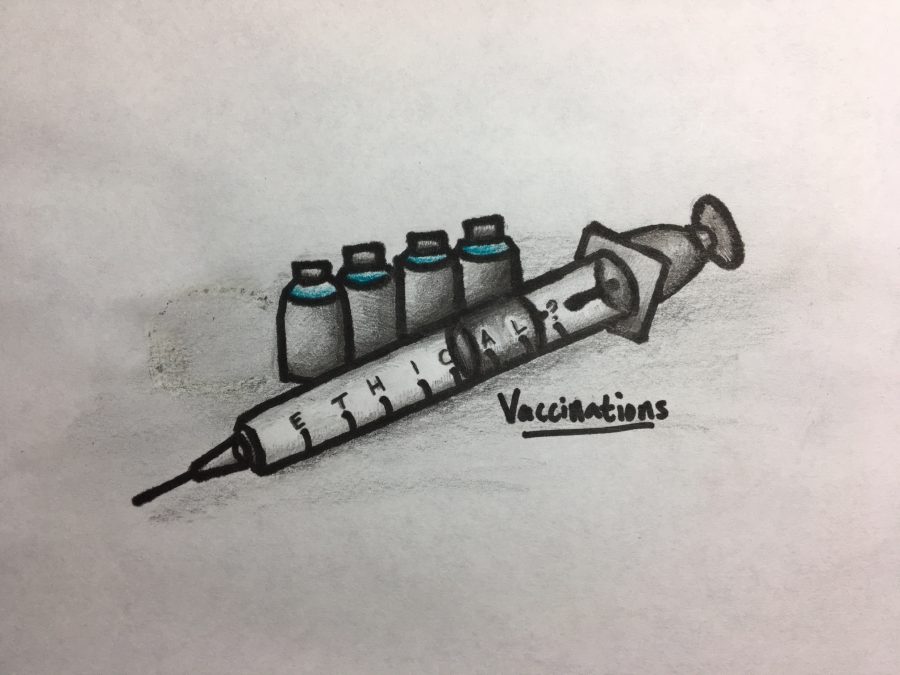Removing the Controversy from Vaccines
November 5, 2016
Imagine if many of the children you knew were suffering from itchy rashes, persistent coughs, paralysis, or were even dead. Such sights would be unbelievably gruesome today, but these scenes were common in the age before modern vaccines.
Despite the incredible success of vaccines, opposition against them has surged in the past few years. Whether it be on the basis of religion or philosophy, misconceptions about vaccines’ safety, or distrust in the pharmaceutical companies that produce them, an increasing amount of people refuse to vaccinate themselves or their children. Consequently, outbreaks of diseases that are easily preventable by vaccines have skyrocketed in the US. According to the Center for Disease Control and Prevention (CDC), from 2014 through September 2016, 910 cases of measles occurred in the country [1]. Unsurprisingly, the overwhelming majority of cases affected unvaccinated people.
Over the past few decades, the safety and effectiveness of vaccines have been proven time and time again. Prominent organizations such as the CDC, the Food and Drug Administration, the American Medical Association, and the American Academy of Pediatrics (only to name a few) all assert that vaccinations are safe [2]. Each year, vaccines prevent the deaths of six million people around the world [3]. Moreover, the risks of refusing vaccinations are much larger than the risks of vaccination—in fact, someone is 100 times more likely to be stuck by lightning then to have a negative reaction to the common measles vaccine [3]. It is also important to note that vaccines do not cause autism and that all major health organizations have disproved this myth [3].
Diseases that have been eliminated in the US are still persistent in developing nations, and it would be devastating if such diseases were to enter an unvaccinated community. By not vaccinating, one can potentially hurt others. Some people are not able to tolerate vaccines since they have poor immune systems or receive chemotherapy. They rely on the people around them to be vaccinated so that, if a disease were to enter their community, it would not reach them. If the majority is unvaccinated and a disease enters, this puts immunocompromised people at great risk.
Kaivalya Hariharan ’20 asserts, “Vaccines are an extremely important part of an overall society’s health… [A]s more people get vaccines, the probability of someone being susceptible to it decreases. People who don’t take vaccines, especially necessary ones such as MMR [measles, mumps, and rubella] put society in a bad situation.”
Considering the enormously large benefits and low risks associated with vaccinations, it is unethical to refuse a vaccine for anything but a medical reason. Governments, whether local, state, or federal, should have the authority to mandate vaccines. One of the primary responsibilities of governments is to keep their constituents healthy. Sometimes, individuals must give up personal choice for a common good (in this case, public health).
Shewta Burgula ’18 expresses a similar view: “The job of the government is to protect the people, and vaccines protect against disease. Society also benefits economically from vaccinations, since it is cheaper to vaccinate than to treat diseases. People who live under a government must give up some rights for protections.”
The Bernards Township School District requires students to have the poliovirus vaccine, MMR vaccine, Hepatitis B vaccine, and the chicken pox vaccine (along with others) [4]. These requirements need to stay, as students often come in close contact in hallways and a disease that is preventable can quickly affect to other students.
It is absolutely imperative that you vaccinate—especially in a globalized society where disease can spread through a plane ride. Check with your doctor to make sure you are up-to-date with your vaccinations.
[1] http://www.cdc.gov/measles/cases-outbreaks.html
[3] http://www.cnn.com/2015/02/03/health/measles-gupta-fact/index.html



